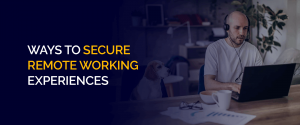

Get 93% OFF on Lifetime
Exclusive Deal
Don’t miss out this deal, it comes with Password Manager FREE of cost.
Get 93% off on FastestVPN and avail PassHulk Password Manager FREE
Get This Deal Now!By Nancy William No Comments 4 minutes
In this article, we’ll talk about the main 3 ways to secure your remote working experiences. Although working from home is by far the most desirable option for many, due to the wide range of perks on both sides of a business, it can also be one of the most challenging regarding security.

Not only are your employees possibly working far apart, but they are all requiring access to your business data banks to complete their daily workloads. However, in order to limit your business’s vulnerability to cybercrimes, there are steps that you and your employees can take.
As mentioned, there are many perks that come from working at home. However, there are still a few factors that most remote workers or employers overlook – cybersecurity or security risks being one of them. To make work from home a more secure experience, here are 3 key points to look into:
For many, this has already been a large part of their personal security measures. For instance, most online banking systems have put this kind of security software into action. MFA (multi-factor authentication) is a way of making sure that it is only the right people who gain access to your business’s data. Often it is a combination of a password and a text or email containing an access code that is sent by way of preset contact data.
Access to your business data will not be allowed unless both the password and access code are correct. Of course, there are other additions you could make to ensure that this system is even more secure.
For instance, providing your employees with their own swipe cards. This would ensure that those individuals that gain access to your data will not only have a physical swipe card that corresponds to the password but will also have access to the text message or email containing the access code.
From time to time, it is likely that your remote workers will want to take their work out and about with them. Whether this means that they will be using the Wi-Fi services of either a local coffee shop, restaurant, or hotel, these public access Wi-Fi options are far from secure. In fact, they are potentially a hacker’s paradise.
With security that is very minimal, they are opening up the possibility of a data breach regardless of the amount of MFA they have had to perform to gain access. So, with this in mind, it is vital that you help them understand the risks that they are taking when moving their working environment out of the safety of their own home.
However, to help prevent cyberattacks, you should install the right kind of security software regardless of where your employee chooses to work. For instance, software such as SASE (or secure access service edge) will provide you with some peace of mind.
SASE can deliver your network over a wide area and administer security controls such as ZT (zero trust). It can also act as a next-generation firewall as it is pre-integrated with the entire network stack. This will help prevent external cyberattacks. Other than that, most workforces encourage the use of VPNs to secure your connection, device, data and maintain your privacy over any network.
So, as you can see, you can protect your business against cybercrime and provide your employees with a much more secure experience while working from home.
Just by implementing new MFA methods, advising your employees about the dangers of using public Wi-Fi systems, and installing the right security software like SASE or a VPN, can make all the difference.
© Copyright 2024 Fastest VPN - All Rights Reserved.


Don’t miss out this deal, it comes with Password Manager FREE of cost.
This website uses cookies so that we can provide you with the best user experience possible. Cookie information is stored in your browser and performs functions such as recognising you when you return to our website and helping our team to understand which sections of the website you find most interesting and useful.
Strictly Necessary Cookie should be enabled at all times so that we can save your preferences for cookie settings.
If you disable this cookie, we will not be able to save your preferences. This means that every time you visit this website you will need to enable or disable cookies again.


